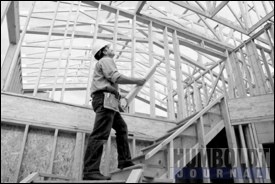The rest of Canada's housing starts may be languishing slightly, but Saskatchewan's building and housing statistics show just the opposite.
According to the Canadian Mortgage and Housing Corporation (CMCH), Saskatchewan saw a spike in activity that placed it fourth among provinces in terms of percentage changes since 2013.
"It's certainly reflective of the growth we're seeing right now," said Kent Campbell, Deputy Minister with the Ministry of Economy. "A lot of it can be attributed to the investment in Saskatchewan. The latest data shows that we're the lowest in unemployment."
According to Campbell, when the economic financial crisis from a few years ago hit, Saskatchewan wasn't hit quite as bad as the other provinces. As a result, Saskatchewan seemed to be able to grow and recover faster.
"The world is demanding the products we produce, such as food, fertilizer, and manufactured goods," said Campbell. "We continue to be relatively strong, particularly for western Canada. We will continue to see global demand for the products we produce."
For Humboldt, however, the evidence of that increased growth isn't being seen as much in the city. A look at building permits, which have increased around the province, hasn't shown much difference locally.
"On the residential side, it's been fairly consistent with about 10 million per year," said Mayor Malcolm Eaton. "The commercial side will fluctuate because of new businesses or buildings such as Boston Pizza or the new school."
Eaton said the city did see an increase in residential building permits in 2006, which reached record levels between 2008 and 2009. Since then, the numbers seemed to have leveled off.
Nonetheless, if Saskatchewan is seeing increased residential growth across the province, consistent housing starts aren't necessarily a bad thing. The challenge now is going to be keeping those numbers consistent, if not continually increasing, especially when competitively compared to other recovering provinces.
"Certainly there's going to be growth, but more moderate growth," said Campbell. "A lot of the demand will be coming from net migration, even from other provinces. The challenge is to make sure we have a competitive environment.
Housing sort of develops as other investments come. If you have other investments coming, you have workers coming, so you need more housing."
Saskatchewan's biggest strengths, said Campbell, might be due to the fact that it's not heavily reliant on one product. By diversifying and being solid in products such as oil, potash, agricultural products, etc., the provincial economy doesn't struggle too much when one industry takes a financial hit.
As is usually the case, unfortunately, rapid housing growth often results in affordable housing difficulties, which is a problem Eaton has been grappling with. His work with the Saskatchewan Urban Municipalities Association (SUMA) is often focused on trying to find solutions on the problem of the affordable housing shortage. The province may be booming in urban housing, but the dark side of that coin has been one of Eaton's many trials.
"We've got a whole bunch of private development at various stages of planning, some of them are going to start proceeding this year," he said. "Others are going to fall into place in the next two, three, or four years. I don't see those (housing) numbers declining; I see them continuing to increase."
Fortunately, Campbell said the problem of low vacancy rates is beginning to moderate itself and catch up. As far as prosperity goes, it's one of the better problems to have.
"That's not to say it's not still a challenge," he said. "We still need to keep an eye on it and that goes for all infrastructure. We don't want to overbuild, but we want to make sure we have the capacity to build up."
As employers express the need for more labour, more workers (both foreign and domestic) will continue to immigrate to Saskatchewan, which will increase the need for more housing. The best the government can do is find a way to fulfill that need in an affordable manner for all parties.
"We want to make sure we're responding to that need as best as we can," said Campbell.




